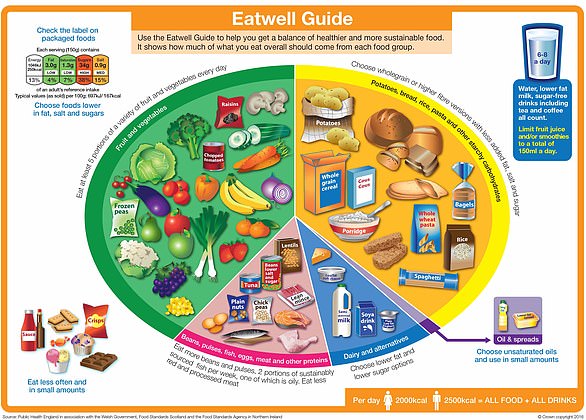Is Britain Secretly Going Vegetarian? MailOnline Reveals ‘Pig’ Sausages On Supermarket Shelves Containing More Fake Meat Than The Real Thing
Vegetarian food company Quorn announced earlier this month that it plans to offer ‘mixed meat products’, surprising carnivores and non-meat eaters alike.
The “half-and-half” products are made from 50 percent pork or beef and 50 percent the brand’s proprietary meat alternative mycoprotein ingredient, made from fungi.
Quorn chief executive Marco Bertacca said they would first be supplied to NHS hospitals in a bid to make patients’ meals healthier, possibly by the end of the year.
Critics reacted angrily, claiming the move showed health authorities had a hidden agenda to “secretly turn Britain vegetarian”.
Now MailOnline has discovered that this practice has been going on for some time, and that many meat products contain far less meat than many realise.
Here, MailOnline reveals the pork sausages on sale in supermarkets with the lowest meat content, and what surprising plant-based additives, such as algae and bamboo, are already in them
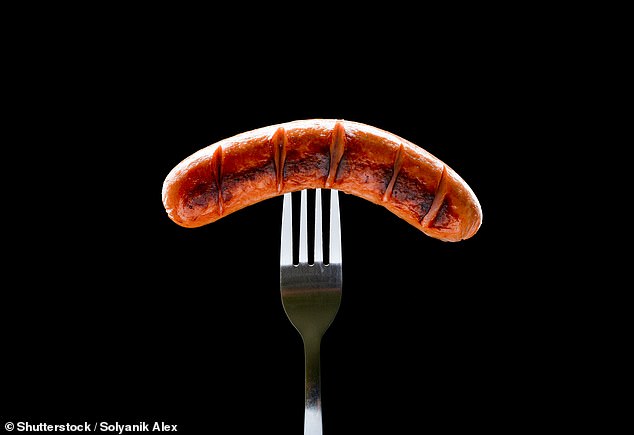
The humble pork sausage could soon be getting an overhaul and becoming more vegetarian in an effort to make us healthier, but supermarket sausages already contain a surprising variety of non-meat ingredients, from bamboo to algae
By law, a pork sausage in the UK must contain 42 percent pork. And many options on supermarket shelves are more vegetarian — with ingredients like algae, soy and bamboo — than meat.
Richmond’s Thick Pork Sausages and Thin Pork Sausages, as well as products from Tesco and Iceland, led the way when it came to their products, meeting the legal minimum of 42 percent pork content.
In addition to water and herbs, wheat and soy proteins were also added to Richmond.
Walls Thick Pork Sausages are only 61 percent meat and also contain soy protein, wheat and potato starch.
Soy protein is a key ingredient in many modern “fake meat” products, including Impossible burgers and sausages, because it has a chewy, meaty texture.
Tesco’s Butcher’s Choice pork sausages, which are 42 percent meat, were enriched with wheat flour, while Iceland’s standard pork sausages contained both wheat flour and barley.
But it was Asda that topped the list for the number of non-meat ingredients in its sausages.
Both the Just Essentials pork sausages (51 percent meat) and the Flavourful Jumbo pork sausages (72 percent meat) contained rice flour, chickpea flour, potato starch and cornstarch. The sausages were not coated with a meat product, but with calcium alginate.
Calcium alginate is a modern food product that is extracted from algae. It is a popular sausage casing for some manufacturers because of its firm but edible structure and because it is easier to process than traditional casings.
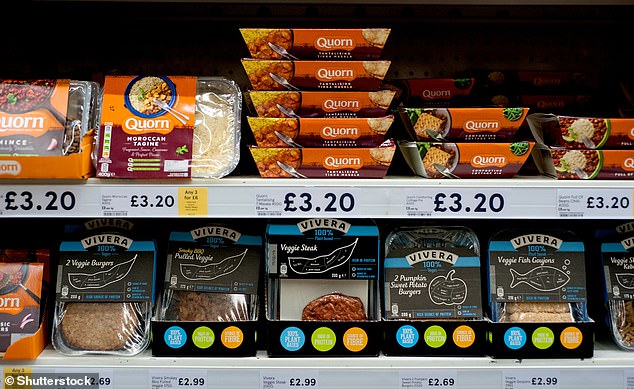
Quorn sits alongside other plant-based meat substitutes on supermarket shelves
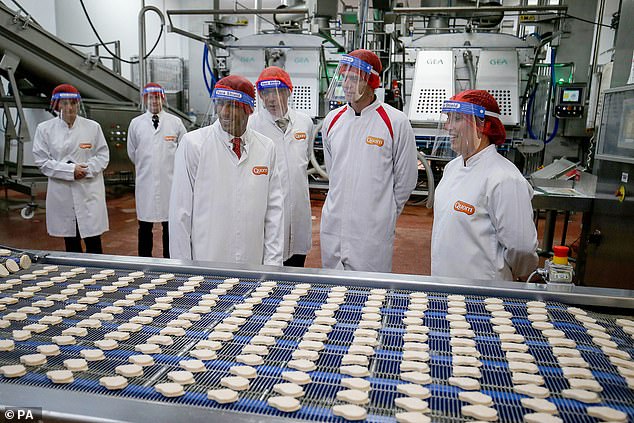
Former Prime Minister Rishi Sunak views the production line during a visit to Quorn’s HQ
Morrison’s The Best Thick Pork Sausages (90 percent meat) was another offering with some surprising plant-based additions, including tapioca flour and psyllium, a fiber made from the seeds of plantago ovata, an herb used in Indian cooking.
Tesco’s Finest Traditional Pork Sausages (90 percent meat) and the standard Pork Sausages (56 percent meat) have bamboo fibre as a listed ingredient.
Sausages are usually not 100 percent meat. They contain fat and rusk, made from wheat, to hold the meat and spices together.
Rusk also provides a pleasant texture and prevents sausages from bursting during frying, because it absorbs fat.
While wheat was and still is one of the most commonly used flours, some manufacturers are opting for rice flour to make their products gluten-free and thus appeal to more customers.
Butchers also like to emphasise that a higher meat percentage does not necessarily lead to a better sausage.
On the website Real bites Butcher Matt Rhoades writes, “A good breakfast sausage should have 55 percent or more pork,” he said.
‘This is ideal because it produces a fine texture that is not too heavy or grainy.’
And for your summer barbecue, bangers and mash, Mr. Rhoades advises choosing a sausage with at least 75 percent meat.
“This gives you a nice, firm, meaty sausage that’s perfect for bangers and mash, a fancy breakfast or great hot dogs on the barbecue,” he said.
Quorn Foods plans to market its mycoprotein products as sausages, as part of the company’s bid to help flexitarians, people who eat meat only occasionally for health reasons or are concerned about the environmental impact of meat consumption.
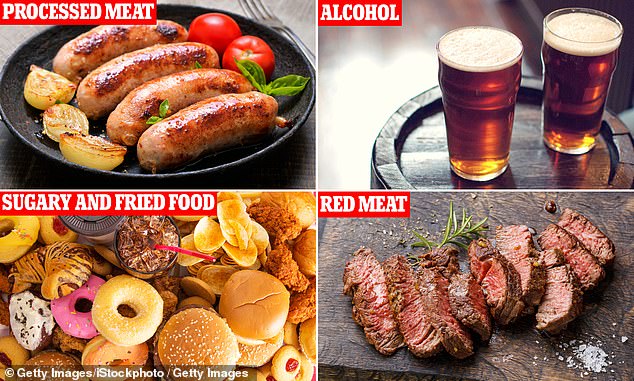
A healthy diet that limits red and processed meat, foods high in sugar, fat and salt, and alcohol has been linked to a lower incidence of cancer.
Sausages are considered processed meat and are typically high in fat and salt. The NHS advises Britons to limit their intake to a maximum of 70g per day.
A diet high in fat and salt can contribute to obesity and high blood pressure, increasing the risk of heart attacks and strokes.
Some studies have also shown that eating a lot of red meat increases the risk of bowel cancer. However, Cancer Research UK says more research is needed.

